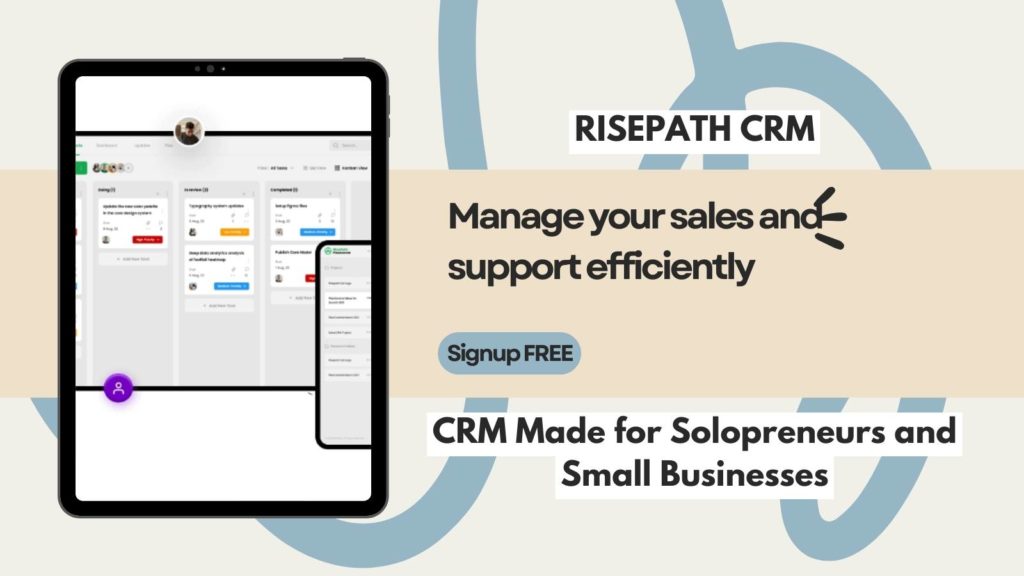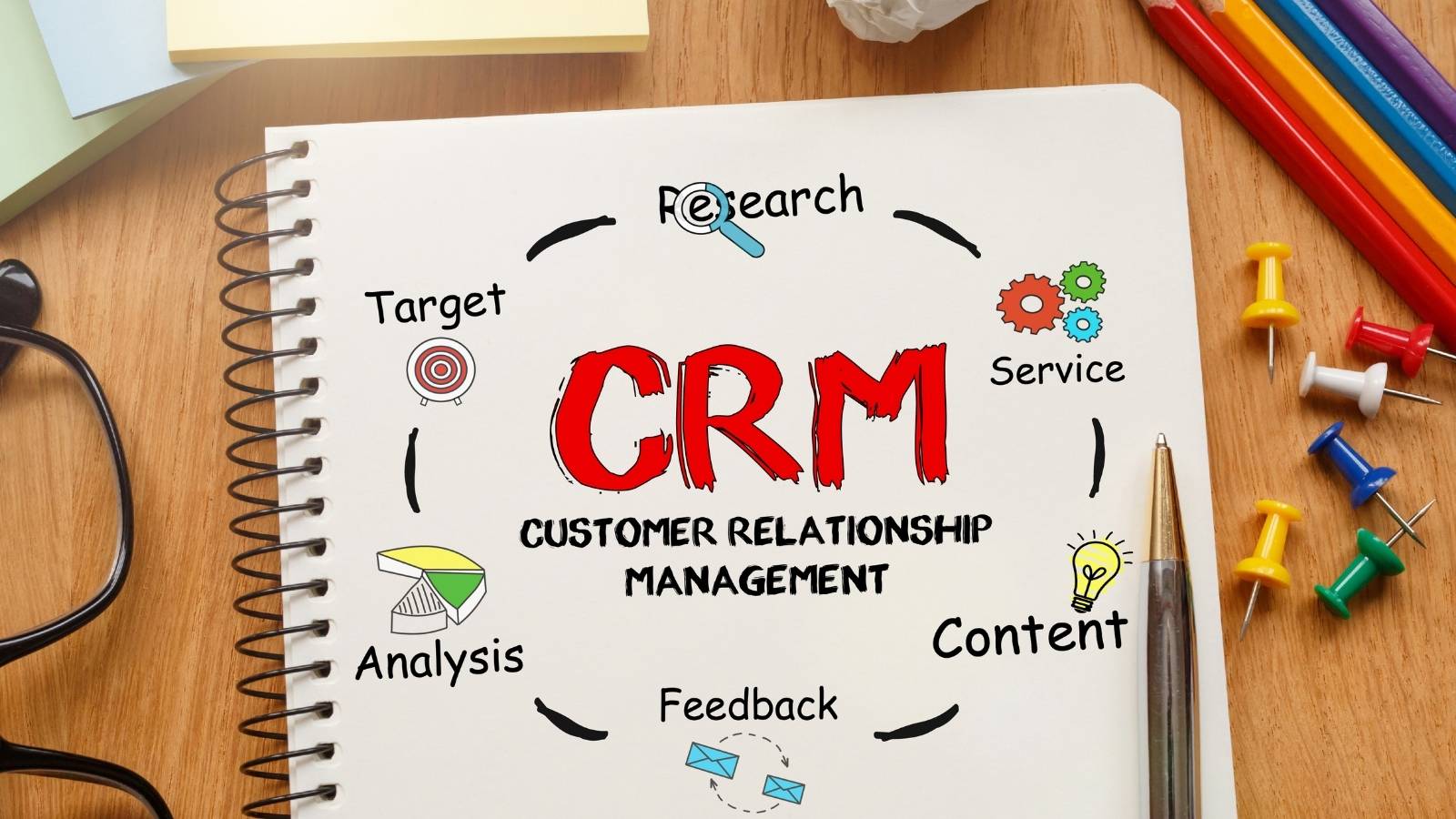Choosing the right software for your small business can be a daunting task. When it comes to managing your customer relations and content, two key types of software on the market are Customer Relationship Management (CRM) and Content Management Systems (CMS).
While they may sound similar, they serve different functions and can have varying benefits for your business. In this blog, we will discuss the differences between CRM and CMS and help you decide which is the best fit for your small business.
What is a CRM?
CRM, which stands for Customer Relationship Management, is a popular strategy implemented by companies to manage customer interactions and data effectively. The primary objective of CRM is to develop customer retention while driving sales growth.

It encompasses several features such as contact management, sales management, and even marketing automation. The CRM system could either be cloud-based or on-premise, depending on the company’s requirements. CRM systems are widely used by numerous industries to improve customer engagement and streamline business processes.
Definition and basic principles
To fully comprehend a concept or theory, its definition is essential. The clear definition of a concept or theory makes it easier for individuals who study or use it to understand it fully. Basic principles play an essential role in building a foundation to understand and practice a concept.
Understanding its defining features and mechanisms is also essential in grasping a concept completely. It is imperative to establish clear definitions and basic principles whether it’s science, philosophy or practical application in order to build a robust body of knowledge.
Why small businesses need a CRM
Small businesses can benefit greatly from implementing a CRM system as it helps to manage customer information in a more efficient and effective manner. With a CRM system, small businesses can easily keep track of all customer interactions and their current status, allowing for better follow-up and customer service.

This leads to improved customer experience and satisfaction, ultimately resulting in improved customer retention. In addition to this, CRM systems also provide valuable insights into customer behavior and preferences, which can be used to make informed business decisions and tailor marketing efforts accordingly.
What is a CMS?
A CMS or Content Management System is a software application that can be very beneficial for managing a website. It allows users to create, edit, and publish content on a website without needing any technical coding skills. A CMS makes it simple for website owners to manage all aspects of their website, from the structure and layout to the content and media.
These platforms have a user-friendly interface that enables website owners to create and publish new content easily and quickly. Additionally, a CMS has features such as version control, workflow management, and collaboration tools that make it easy for multiple users to work on the same website at the same time.
Definition and basic principles
In any concept or theory, the definition and basic principles serve as the foundation upon which it is built. Definition sets up the boundaries and parameters of what is being defined, while basic principles outline the fundamental concepts that underlie it.
By establishing clarity and specificity in definition and basic principles, communication and understanding are facilitated, and misunderstandings, confusion, and errors can be avoided. Therefore, it is imperative to establish clear and precise definitions and foundational principles in order to cultivate a robust body of knowledge.
Why small businesses need a CMS
As small businesses expand, managing their website content becomes integral in maintaining a strong online presence. However, not every small business owner is equipped with the technical expertise needed to modify their website.
This is where a CMS or Content Management System comes into play. By using a CMS, small businesses can streamline the content creation and publishing process, eliminating the need for technical assistance.
Moreover, a CMS offers advanced features as they maintain the website, which can attract more customers with a better-looking and functional layout. It saves valuable time for small business owners and helps them manage their website’s SEO to enhance their online visibility.
Differences between CRM and CMS
CRM and CMS are both crucial tools that businesses can use to manage their operations better. However, their functionalities and primary objectives differ considerably. CRM primarily focuses on managing customer relationships by tracking and analyzing customer data, improving communication, and enhancing customer experience.

On the other hand, CMS focuses mainly on managing website content without necessarily emphasizing customer interactions. Both tools are essential, but CRM is designed to prioritize customer satisfaction and retention while CMS helps effectively manage website content.
Functionality and features
When it comes to creating any product or service, functionality and features are essential elements that should never be overlooked. It determines the usefulness and appeal of the product to consumers. Although aesthetics play a crucial role in attracting customers, developers must prioritize functionality over aesthetics because, ultimately, users care more about how a product functions than how it looks.
Incorporating unique and innovative features can also set a product apart from competitors and make it more attractive to potential customers. However, developers should conduct usability testing to ensure that a product’s functionality and features align with the needs and expectations of its target audience.
Examples of scenarios where one is more suitable than the other
In many situations, choosing the most suitable tool for a task can make all the difference in achieving success. For instance, when dealing with large datasets, coding in Python might prove more effective than using Excel. Small businesses with a tight budget might find social media platforms more suitable for marketing purposes than expensive TV ads.
During peak hours in highly congested cities, taking the train may turn out to be a more practical option than driving. Additionally, for individuals with hectic schedules, learning through online courses could be a more suitable alternative to attending traditional physical classes.
Benefits of a CRM
Using a CRM can not only help small businesses manage their customer relationships but also improve customer loyalty and retention. The streamlined sales and marketing processes can result in increased efficiency, leading to higher revenue.

Moreover, enhanced data management can provide better insights into business operations, which can aid decision-making processes.
Lastly, using a CRM can improve communication and collaboration among team members, which can lead to increased productivity. By incorporating a CRM, small businesses can benefit from various features that can translate to better business outcomes.
Improved customer relationships
Improving customer service is vital for any small business, as it leads to higher customer retention rates and increased satisfaction levels. Investing in employee training programs can result in better communication skills, which can help build stronger relationships with customers. Responding quickly and efficiently to customer inquiries and complaints can help establish trust and foster positive relationships.
Moreover, providing personalized experiences and tailoring products or services to meet the specific needs of customers can enhance the overall customer experience and improve relationships. Implementing these practices can help small businesses excel in the market and create a loyal customer base.
Increased sales and revenue
For a small business to succeed, implementing effective marketing strategies is crucial. Introducing loyalty programs and discounts can entice customers to make more purchases, leading to a boost in sales and revenue.
Additionally, enhancing the quality of products or services offered can result in higher customer satisfaction, which in turn can drive greater sales and revenue. Furthermore, expanding the business to new markets can create more opportunities for sales, ultimately increasing revenue and maximizing profitability. By utilizing these proven marketing strategies, small businesses can achieve sustainable growth and success.
Automated marketing
Automated marketing is a powerful tool that utilizes technology to perform repetitive marketing tasks and processes. This includes personalized and timely communications that can enhance lead generation and conversion rates.
With the constant evolution of marketing automation tools, incorporating features like AI and machine learning have become a key element in optimizing marketing strategies. The benefits of automation are numerous, such as increased efficiency, reduced human error, and the ability to analyze and refine marketing campaigns based on data insights.
By leveraging these benefits, small businesses can achieve greater success and reduce the workload of manual tasks.
Analytics and reporting
Analytics and reporting are invaluable tools that enable organizations from various industries to make data-driven decisions and improve their performance. Whether it is in healthcare, finance, or e-commerce, analytics and reporting help businesses monitor and evaluate marketing campaigns, identify opportunities for growth, and mitigate risks.
One of the key benefits is the use of data visualization tools that simplify complex data sets, making it easier for businesses to interpret and communicate insights to stakeholders. Moreover, advanced techniques like predictive modeling and machine learning enable businesses to forecast future trends and outcomes, giving them a competitive edge in the market.
Benefits of a CMS
A CMS, or Content Management System, can be incredibly beneficial for small businesses looking to manage their website content more efficiently. With a CMS, businesses can collaborate among multiple users, organize and categorize content in a streamlined way, and easily update and modify website design without the need for technical skills or knowledge.

Furthermore, many CMSs come equipped with built-in SEO features that can help boost website visibility in search engines, allowing small businesses to stay competitive in the digital arena.
Ease of website management
In today’s digital age, maintaining an engaging and up-to-date website is crucial for small businesses. However, managing a website can be a challenging and time-consuming task, especially for those without technical expertise.
Fortunately, with the use of a content management system (CMS), managing and updating a website has become easier than ever.
By offering an intuitive user interface design and automated backend processes, a CMS provides a streamlined and centralized approach to website management. Regular website audits and updates can also ensure ongoing ease in website management and user experience.
Customization options
One of the key benefits of implementing a CRM for small business is the ability to provide strong customization options for customers. These options range from basic preferences like language settings and color schemes to more complex recommendations based on previous purchases or behavior.
Effective customization options can enhance the overall user experience, increasing customer satisfaction levels and promoting customer loyalty.
However, it is important to strike a balance and avoid overwhelming the user with too many choices. By providing enough relevant customization options, small businesses can improve relationships with customers and differentiate themselves in the market.
SEO optimization
SEO optimization is crucial for small businesses looking to boost their visibility online. By using relevant keywords and meta tags, businesses can improve their website’s ranking on search engines and attract more potential customers.
It’s also important to have a clear website structure and user-friendly interface in order to enhance the user experience and improve search engine optimization.
Regularly updating your website with fresh and relevant content is another effective way to improve your search engine ranking. Additionally, optimizing images and videos with descriptive file names and alt tags can also contribute to better SEO optimization.
By implementing these strategies, small businesses can increase their online presence and attract more traffic to their website.
Content creation and collaboration
In today’s fast-paced digital landscape, collaboration is vital for small businesses looking to create high-quality content and stay ahead of the competition. By fostering effective communication and teamwork among team members, small businesses can tap into a diverse range of perspectives and ideas, which can lead to better content.
Collaborative tools and platforms such as Google Docs and Trello can also streamline content creation and collaboration processes, reducing the workload of manual tasks and increasing overall productivity.
How to choose between CRM and CMS for your small business
When deciding between CRM or CMS, it is important to consider your business goals and needs. A CMS is more suitable if your business focuses mainly on creating and publishing content, whereas a CRM is ideal for businesses that require customer relationship management features.
Evaluating your budget and resources is also crucial, as it will determine whether a CRM or CMS is more feasible for your business’s financial capabilities and technical expertise.
Finally, scalability and customizability options should be taken into account when deciding between the two platforms, in order to determine which can best accommodate your business’s future growth and development plans.
Identifying your business needs
As a small business owner, it is essential to understand the needs and challenges of your target audience. Conducting a SWOT analysis can help identify your business’s strengths, weaknesses, opportunities, and threats.
Additionally, listening to feedback from customers and employees can provide valuable insights into areas that need improvement. It is also crucial to regularly analyze financial data to identify areas where cost-cutting measures can be implemented and efficiency improved.
By incorporating these practices, small businesses can identify their needs and focus on improving their business operations and ultimately increase profitability.
Considering budget and resources
One of the most important steps in undertaking any project is to evaluate the available budget and resources. Setting clear and realistic budget goals is crucial to keep projects on track and avoid wasting resources.
It is also essential to assess all resources and make a plan to efficiently utilize them, including coordinating with team members and outsourcing when necessary. By carefully managing the budget and resources, businesses can ensure project success and improve efficiency and profitability in the long term.
Evaluating potential solutions
When deciding between CRM and CMS solutions for your small business, it’s important to carefully analyze the pros and cons of each potential option before making a decision. Additionally, assessing the feasibility of implementing each solution and considering the potential impact on stakeholders should also be taken into account.
It’s also helpful to use data and metrics to evaluate the effectiveness of each proposed solution, allowing for informed decision-making that can benefit both your business and its customers.
Integration options
Small businesses looking to integrate their CRM or CMS with other systems have several options at their disposal, including REST APIs, webhooks, and SDKs. REST APIs provide a flexible integration option that allows for accessing and manipulating data with ease.
Webhooks offer a solution for real-time data exchange between connected systems, providing a way for businesses to stay up-to-date with important information.
SDKs come with pre-built libraries that developers can use to facilitate integration, making it an easier and more efficient process. By choosing the right integration option, small businesses can streamline their operations and improve overall productivity.
CRM and CMS integration
Integrating a CRM and CMS can greatly improve sales and marketing processes by facilitating collaboration between teams and providing a more comprehensive view of customers. By combining the data from CMSs and CRMs, businesses gain a more complete understanding of customer behaviour and preferences.
This allows them to track customer touch-points across multiple channels and establish patterns and trends that can be used to improve the customer experience. Moreover, businesses can leverage the valuable analytics produced by the integration to measure the performance of their content, sales, and marketing activities and identify opportunities for improvement.
Third-party integration
In today’s fast-paced business environment, companies need to have technology solutions that work seamlessly together to maximize productivity and efficiency. Third-party integration allows businesses to connect their systems with external applications and services to enhance the functionality of their existing infrastructure.
The integration process is made easier with the use of APIs and webhooks, making it accessible to businesses of all sizes.
Integrating with popular third-party tools like Salesforce and Slack can streamline workflows and improve communication within teams, further increasing productivity and effectiveness. By adopting third-party integration, businesses can expand the capabilities of their technology infrastructure without having to build new solutions from scratch.
Pros and cons of integration
Integrating business processes and systems can offer numerous benefits, including improved efficiency and data accuracy, and the creation of a centralized system leading to a better customer experience. However, the decision to integrate should not be taken lightly, as it involves costs and potential risks to data security.
Another consideration is the potential increase in complexity and technical difficulties that can arise from integration. Ultimately, the choice to integrate will depend on a variety of factors, such as the size and complexity of the business, available technological resources, costs and benefits, and other specific needs and requirements.
Choosing the right solution for your business
Choosing between a CRM and a CMS solution for your small business can be a daunting task, but there are several factors to consider when making this decision. One crucial aspect is the budget for the solution, and it’s essential to identify a solution that fits within it.
Another factor is evaluating the unique needs of your business and selecting a solution that addresses those needs.
It’s also essential to research and compare different solutions to find one that offers the best features and benefits. Moreover, choosing a solution that is user-friendly and can be easily integrated into your existing systems is crucial for efficient operations.
By taking these factors into account, businesses can make an informed decision and select a solution that meets their specific needs and budget constraints.
Establishing priorities
Establishing priorities is crucial for small businesses as it helps in focusing on important tasks and avoiding time wastage on less important ones. Before setting priorities, it is essential to evaluate goals and objectives to ensure that they align with the business vision.
Once goals are prioritized, it’s important to create a plan of action that outlines the necessary steps needed to accomplish those goals. By prioritizing tasks, small businesses can improve their productivity, decrease stress levels, and have a better work-life balance.
Therefore, it is imperative that small business owners prioritize their tasks to achieve their desired outcomes.
Researching vendors
When it comes to making decisions for your small business, researching vendors is crucial. Conducting a thorough investigation of potential vendors can save you both time and money in the long run.
It is important to consider factors such as reputation, price, and the quality of products or services offered. In this digital age, online reviews and testimonials can provide valuable insights into the experiences of others with a particular vendor.
So before choosing a vendor, be sure to do your research to make an informed decision that is best for your business.
Testing and evaluating options
Testing and evaluating options is crucial for small businesses to make informed decisions. While testing and evaluating, it is imperative to consider multiple factors like functionality, customization, pricing, integration, and more.
One way to simplify the process is by creating a checklist that outlines the essential features and requirements for the business.
Testing and evaluating options can help identify the strengths and weaknesses of each option, making it easier to choose the best solution that matches the business needs and budget constraints.
Implementation and training
Proper implementation is crucial for the success of any new system or process. This involves providing training to individuals who will be interacting with the new implementation.
Effective communication regarding the implementation plan is equally important in ensuring its success.
Ongoing training and support should also be provided to ensure that individuals are able to use the new system with confidence. Only by following these guidelines can businesses make the most out of their investment in a new system or process.
Conclusion
In conclusion, every sector is facing its own set of challenges and it is crucial to address them in order to succeed. For the transport sector, climate change, traffic congestion, safety concerns, and the need to reduce costs pose significant challenges. Meanwhile, research has found a definite link between good mental health and exercise.
The success of any business mainly depends on its ability to adapt to change and maintain customer satisfaction while managing costs and innovating their product offerings.
Based on the evidence presented, it is safe to conclude that the proposed strategy has the potential to improve customer satisfaction and increase profitability for the company.
Summarizing key takeaways
Summarizing key takeaways is crucial to remember the most significant information from a source. While summarizing, it’s important to concentrate on the primary ideas and exclude irrelevant details. To create a well-constructed summary, active reading, careful note-taking, and the ability to recognize important details are essential.
An ideal summary should be concise, precise, and provide a clear foundation for understanding the subject matter. Therefore, by summarizing, one can quickly grasp the core elements of the text and use the information effectively in the future.
Emphasizing the importance of choosing the right solution
Choosing the right solution is critical as it can greatly impact the success of a project or task. Opting for the wrong solution can result in a waste of time, money, and resources that could have been invested more effectively in the correct solution.
On the other hand, selecting the right solution can lead to increased efficiency, productivity, and improved outcomes. The right solution can also help to mitigate risks and increase the chances of achieving desired results. Therefore, it is essential to weigh all factors carefully and make an informed decision when choosing the best solution for your business.

Comments are closed, but trackbacks and pingbacks are open.